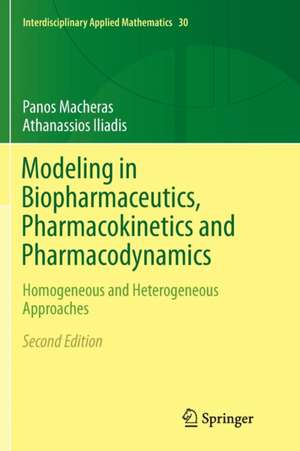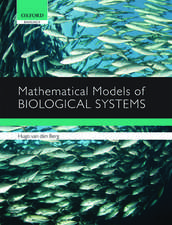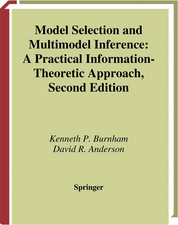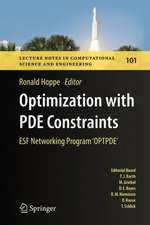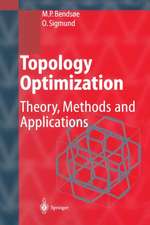Modeling in Biopharmaceutics, Pharmacokinetics and Pharmacodynamics: Homogeneous and Heterogeneous Approaches: Interdisciplinary Applied Mathematics, cartea 30
Autor Panos Macheras, Athanassios Iliadisen Limba Engleză Paperback – 22 apr 2018
The book is divided into four parts; the first deals with the fundamental principles of fractals, diffusion and nonlinear dynamics; the second with drug dissolution, release, and absorption; the third with epirical, compartmental, and stochastic pharmacokinetic models, with two new chapters, one on fractional pharmacokinetics and one on bioequivalence; and the fourth mainly with classical and nonclassical aspects of pharmacodynamics. The classical models that have relevance and application to these sciences are also considered throughout. This second edition has new information on reaction limited models of dissolution, non binary biopharmaceutic classification system, time varying models, and interface models. Many examples are used to illustrate the intrinsic complexity of drug administration related phenomena in the human, justifying the use of advanced modeling methods.
This book will appeal to graduate students and researchers in pharmacology, pharmaceutical sciences, bioengineering, and physiology.
Reviews of the first edition:
"This book presents a novel modelling approach to biopharmaceutics, pharmacokinetics and pharmacodynamic phenomena. This state-of-the-art volume will be helpful to students and researchers in pharmacology, bioengineering, and physiology. This book is a must for pharmaceutical researchers to keep up with recent developments in this field." (P. R. Parthasarathy, Zentralblatt MATH, Vol. 1103 (5), 2007)
"These authors are the unique (or sole) contributors in this area that are working on these questions and bring a special expertise to the field that is now being recognized as essential to understanding biological system and kinetic/dynamic characteristics in drug development...This text is an essential primer for those who would envision the incorporation of heterogeneous approaches to systems where homogeneous approaches are not sufficient to describe the system." (Robert R. Bies, Journal of Clinical Pharmacology, Vol. 46, 2006)
| Toate formatele și edițiile | Preț | Express |
|---|---|---|
| Paperback (2) | 639.30 lei 38-44 zile | |
| Springer – 22 noi 2010 | 639.30 lei 38-44 zile | |
| Springer International Publishing – 22 apr 2018 | 902.36 lei 6-8 săpt. | |
| Hardback (1) | 1181.99 lei 6-8 săpt. | |
| Springer International Publishing – 19 apr 2016 | 1181.99 lei 6-8 săpt. |
Din seria Interdisciplinary Applied Mathematics
- 19%
 Preț: 420.88 lei
Preț: 420.88 lei - 15%
 Preț: 667.05 lei
Preț: 667.05 lei - 20%
 Preț: 664.77 lei
Preț: 664.77 lei - 15%
 Preț: 980.97 lei
Preț: 980.97 lei - 17%
 Preț: 528.45 lei
Preț: 528.45 lei - 9%
 Preț: 630.35 lei
Preț: 630.35 lei - 18%
 Preț: 908.71 lei
Preț: 908.71 lei - 18%
 Preț: 1006.38 lei
Preț: 1006.38 lei - 15%
 Preț: 659.67 lei
Preț: 659.67 lei -
 Preț: 498.14 lei
Preț: 498.14 lei -
 Preț: 528.35 lei
Preț: 528.35 lei - 15%
 Preț: 659.02 lei
Preț: 659.02 lei - 15%
 Preț: 480.52 lei
Preț: 480.52 lei -
 Preț: 390.63 lei
Preț: 390.63 lei - 18%
 Preț: 918.61 lei
Preț: 918.61 lei -
 Preț: 388.52 lei
Preț: 388.52 lei - 15%
 Preț: 647.92 lei
Preț: 647.92 lei - 15%
 Preț: 655.60 lei
Preț: 655.60 lei - 23%
 Preț: 734.81 lei
Preț: 734.81 lei - 15%
 Preț: 660.83 lei
Preț: 660.83 lei - 18%
 Preț: 967.08 lei
Preț: 967.08 lei -
 Preț: 809.10 lei
Preț: 809.10 lei -
 Preț: 403.91 lei
Preț: 403.91 lei - 18%
 Preț: 896.84 lei
Preț: 896.84 lei - 18%
 Preț: 1004.00 lei
Preț: 1004.00 lei - 18%
 Preț: 974.19 lei
Preț: 974.19 lei -
 Preț: 399.67 lei
Preț: 399.67 lei - 23%
 Preț: 639.30 lei
Preț: 639.30 lei
Preț: 902.36 lei
Preț vechi: 1100.44 lei
-18% Nou
Puncte Express: 1354
Preț estimativ în valută:
172.69€ • 179.62$ • 142.56£
172.69€ • 179.62$ • 142.56£
Carte tipărită la comandă
Livrare economică 15-29 aprilie
Preluare comenzi: 021 569.72.76
Specificații
ISBN-13: 9783319801810
ISBN-10: 3319801813
Pagini: 483
Ilustrații: XXII, 483 p. 157 illus., 1 illus. in color.
Dimensiuni: 155 x 235 mm
Greutate: 0.77 kg
Ediția:Softcover reprint of the original 2nd ed. 2016
Editura: Springer International Publishing
Colecția Springer
Seria Interdisciplinary Applied Mathematics
Locul publicării:Cham, Switzerland
ISBN-10: 3319801813
Pagini: 483
Ilustrații: XXII, 483 p. 157 illus., 1 illus. in color.
Dimensiuni: 155 x 235 mm
Greutate: 0.77 kg
Ediția:Softcover reprint of the original 2nd ed. 2016
Editura: Springer International Publishing
Colecția Springer
Seria Interdisciplinary Applied Mathematics
Locul publicării:Cham, Switzerland
Cuprins
Part I: Basic Concepts.- The Geometry of Nature.- Diffusion and Kinetics.- Nonlinear Dynamics.- Part II: Modeling in Biopharmaceutics.- Drug Release.- Drug Dissolution.- Oral Drug Absorption.- Part III: Modeling in Pharmacokinetics.- Empirical Models.- Deterministic Compartmental Models.- Fractional Pharmacokinetics.- Modeling and Simulation in Bioequivalence.- Stochastic Compartmental Models.- Part IV: Modeling in Pharmacodynamics.- Classical Pharmacodynamics.- Nonclassical Pharmacodynamics.- Appendices.
Textul de pe ultima copertă
The state of the art in Biopharmaceutics, Pharmacokinetics, and Pharmacodynamics Modeling is presented in this new second edition book. It shows how advanced physical and mathematical methods can expand classical models in order to cover heterogeneous drug-biological processes and therapeutic effects in the body.
The book is divided into four parts; the first deals with the fundamental principles of fractals, diffusion and nonlinear dynamics; the second with drug dissolution, release, and absorption; the third with epirical, compartmental, and stochastic pharmacokinetic models, with two new chapters, one on fractional pharmacokinetics and one on bioequivalence; and the fourth mainly with classical and nonclassical aspects of pharmacodynamics. The classical models that have relevance and application to these sciences are also considered throughout. This second edition has new information on reaction limited models of dissolution, non binary biopharmaceutic classification system, time varying models, and interface models. Many examples are used to illustrate the intrinsic complexity of drug administration related phenomena in the human, justifying the use of advanced modeling methods.
This book will appeal to graduate students and researchers in pharmacology, pharmaceutical sciences, bioengineering, and physiology.
Reviews of the first edition:
"This book presents a novel modelling approach to biopharmaceutics, pharmacokinetics and pharmacodynamic phenomena. This state-of-the-art volume will be helpful to students and researchers in pharmacology, bioengineering, and physiology. This book is a must for pharmaceutical researchers to keep up with recent developments in this field." (P. R. Parthasarathy, Zentralblatt MATH, Vol. 1103 (5), 2007)
"These authors are the unique (or sole) contributors in this area that are working on these questions and bring a special expertise to the field that isnow being recognized as essential to understanding biological system and kinetic/dynamic characteristics in drug development...This text is an essential primer for those who would envision the incorporation of heterogeneous approaches to systems where homogeneous approaches are not sufficient to describe the system." (Robert R. Bies, Journal of Clinical Pharmacology, Vol. 46, 2006)
The book is divided into four parts; the first deals with the fundamental principles of fractals, diffusion and nonlinear dynamics; the second with drug dissolution, release, and absorption; the third with epirical, compartmental, and stochastic pharmacokinetic models, with two new chapters, one on fractional pharmacokinetics and one on bioequivalence; and the fourth mainly with classical and nonclassical aspects of pharmacodynamics. The classical models that have relevance and application to these sciences are also considered throughout. This second edition has new information on reaction limited models of dissolution, non binary biopharmaceutic classification system, time varying models, and interface models. Many examples are used to illustrate the intrinsic complexity of drug administration related phenomena in the human, justifying the use of advanced modeling methods.
This book will appeal to graduate students and researchers in pharmacology, pharmaceutical sciences, bioengineering, and physiology.
Reviews of the first edition:
"This book presents a novel modelling approach to biopharmaceutics, pharmacokinetics and pharmacodynamic phenomena. This state-of-the-art volume will be helpful to students and researchers in pharmacology, bioengineering, and physiology. This book is a must for pharmaceutical researchers to keep up with recent developments in this field." (P. R. Parthasarathy, Zentralblatt MATH, Vol. 1103 (5), 2007)
"These authors are the unique (or sole) contributors in this area that are working on these questions and bring a special expertise to the field that isnow being recognized as essential to understanding biological system and kinetic/dynamic characteristics in drug development...This text is an essential primer for those who would envision the incorporation of heterogeneous approaches to systems where homogeneous approaches are not sufficient to describe the system." (Robert R. Bies, Journal of Clinical Pharmacology, Vol. 46, 2006)
Caracteristici
Updated state-of-the-art information on biopharmaceutic, pharmacokinetic, and pharmacodynamic modeling New chapters on Bioequivalence and Fractional Pharmacokinetics, contributed by leaders in the field New sections on time-varying models and interface models Appeals to both graduate students and researchers in pharmacology, pharmaceutical sciences, bioengineering, and physiology Covers the theory with specific examples behind all three under the perspective of heterogeneous processes while also treating the current state of the art in applied and theoretical BPP
Recenzii
From the reviews:
"This book presents a novel modelling approach to biopharamceutics, pharmacokinetics and pharmacodynamic phenomena. … This state-of-the-art volume will be helpful to students and researchers in pharmacology, bioengineering, and physiology. This book is a must for pharmaceutical researchers to keep up with recent developments in this field." (P. R. Parthasarathy, Zentralblatt MATH, Vol. 1103 (5), 2007)
"This book presents a novel modelling approach to biopharamceutics, pharmacokinetics and pharmacodynamic phenomena. … This state-of-the-art volume will be helpful to students and researchers in pharmacology, bioengineering, and physiology. This book is a must for pharmaceutical researchers to keep up with recent developments in this field." (P. R. Parthasarathy, Zentralblatt MATH, Vol. 1103 (5), 2007)
